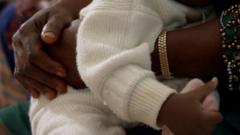The desperation for motherhood can drive women to extremes, a reality epitomized by Chioma's distressing experience in Nigeria. After eight years of unsuccessful attempts to conceive, Chioma now holds her newborn son, Hope, proudly declaring him her "miracle baby." However, her joy is overshadowed by skepticism from her husband's family and the alarming circumstances surrounding the child's conception.
As Chioma recounts her story to Ify Obinabo, the Anambra state commissioner for women affairs and social welfare, the truth begins to emerge. Chioma insists that she "carried" Hope for around 15 months, an assertion met with disbelief. Under immense pressure from her husband's relatives to bear children, she ultimately turned to a shady clinic offering dubious fertility treatments that prey on vulnerable women yearning for children.
Authorities, including the BBC's Africa Eye team, are exploring the dark world of "cryptic pregnancy" scams where fraudsters masquerade as medical professionals. These scammers entice desperate women with promises of miracle pregnancies, leveraging their insecurities and societal pressures. For a substantial fee, women receive questionable "treatments" that result in physical changes, leading them to believe they are pregnant.
These clinics exploit the notion of "cryptic pregnancy," where a woman is unaware of her pregnancy until late stages, and further manipulate their clients by advising against conventional medical care. When it comes time for delivery, women are sedated or induced in patterns that highlight the grotesque nature of this scam. Chioma's experience, though horrific, is but one of many across Nigeria.
The investigation revealed a wide-ranging network of misinformation and support groups promoting false narratives about pregnancy. Online platforms have become breeding grounds where women share their fabricated stories of endless pregnancies, luring others into the trap of deceit alongside operators of these scams.
Commissioner Obinabo, amidst her efforts to combat this growing problem, relates how the scammers rely on a supply of newborns by seeking out women like Uju, who feel trapped and seek financial aid in a society where abortion is prohibited. During a raid in February 2024, health officials uncovered a facility where several women were being held against their will, underscoring the dire consequences of this exploitation.
Despite the harsh realities, Chioma was allowed to keep baby Hope after the commissioner recognized her vulnerability in the ordeal. Without substantial changes in the sociocultural attitudes regarding women's reproductive rights and systemic support for motherhood, the heartbreaking cycle of such scams is bound to continue thriving in Nigeria.
This grim scenario ultimately serves as a reminder of the urgent need for awareness and transformation of reproductive rights in communities that consistently place pressures on women.




















